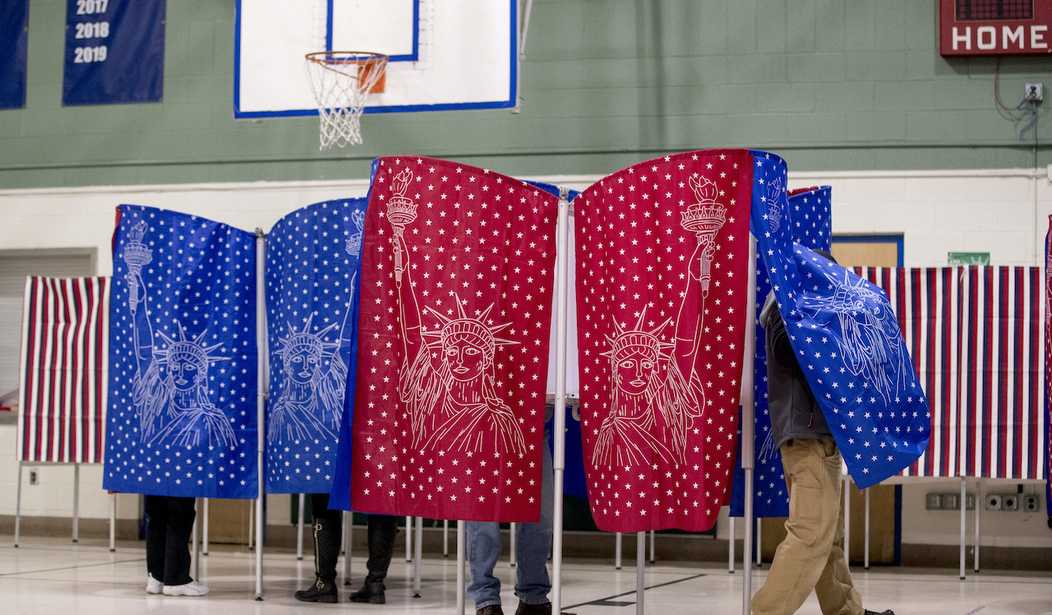Yesterday, S1, the Senate version of HR-1, the For the People Act, was prevented from progressing to debate when Senate Republicans withheld their votes on cloture. They prevented S1 from being debated, so the legislation is functionally dead for the remainder of the session. Republicans provided a rare show of unity on the issue, with even the squish caucus ignoring charges of Jim Crow, voter suppression, and a corporate media drumbeat about the urgent need to pass this legislation.
So how did the entire caucus spine up? Minority Leader Mitch McConnell gave a bit of insight when he spoke on the Senate floor. At the beginning of his remarks, he said:
“Later today the Senate will vote on whether to advance the Democrat’s transparent and partisan plan to tilt every election in America permanently in their favor. By now the rotten inner workings of this power grab have been thoroughly exposed to the light.”
Americans who paid attention also saw another strange phenomenon. Left-wing activists, such as failed Georgia gubernatorial candidate Stacey Abrams, seemed to drop their objections to voter ID magically. Abrams has leaned on the voter suppression meme for years to defend never conceding that she lost to Brian Kemp in 2018. Voter ID has always been a critical component of this meme for Democrats. So, what is happening?
Meet one behind-the-scenes influencer who helped some Republicans refine their message on S1 and possibly changed the tune of leading Democrats. Jason Snead is the executive director of Honest Elections. His organization commissioned and communicated poll findings on the details of the For the People Act. They found that once respondents understood the hidden elements of the bill, they did not support it.
Snead communicated the results to members of Congress and state legislators. The summary definitively showed that voters were more concerned about preventing fraud than making voting easier by eliminating safeguards such as voter ID or mandating the practice of ballot trafficking by political operatives. A significant majority also objected to taxpayer-funded political campaigns, a vital feature of the bill:
H.R. 1 is out of sync with American voters. Few embrace its particular provisions, or its guiding principle that election integrity and voter confidence measures make voting “hard” and that Congress must impose new laws that eliminate them. In fact, voters overwhelmingly prioritize maintaining confidence in elections over making voting “easier.” Most Americans want credible elections backed up by fair rules that make voting both accessible and secure, and only 28% of voters support H.R. 1’s final passage once they are provided with an understanding of its provisions.
Republican messaging echoed the findings in Snead’s communication. Senator Ted Crux (R-Texas) dubbed H.R. 1 and S1 the “Corrupt Politicians Act,” hammering the taxpayer funding of political campaigns for incumbents. More importantly, the poll results directed messaging and informed Senators that the legislation would be broadly unpopular if they communicated specific elements.
Related: Ted Cruz Eviscerates Legacy Media’s ‘Gotcha!’ Attack
Snead started Honest Elections in the lead-up to the 2019 election because of several years of increasing election litigation going into contentious election cycles. Democrats and the left had shown an increasing willingness to litigate, using the courts to change election laws for political and policy reasons that had nothing to do with the constitutional right to vote.
According to Snead, attorney Mark Elias has been shepherding an extremely well-funded effort in this area for several years. That effort reached a crescendo in 2020. Snead’s goal is to counter that with a group of competent election law professionals and policy experts. Since the election, Snead’s organization has been collecting the information needed to combat H.R. 1 and monitoring the progress of election-related bills at the state and national levels. He sees the failure of S1 to clear the cloture hurdle as a win. However, it’s how his organization contributed to the victory that matters.
Legislation has become increasingly complex. Democrats also have a habit of naming their complicated and often radical legislation with aspirational ideas. Then the party, its representatives, and its allies in the corporate media have remarkable message discipline related almost exclusively to those aspirational ideas. Snead’s polling and communication broke through that wall by diving into the details and giving Republicans solid data around the deeply unpopular elements of the legislation to communicate to the public.
These deep dives by interest groups using real data need to become more common, especially related to legislation that is hundreds of pages long. Republicans and their allies also need to build a communication structure for these initiatives that ensure they are broadly communicated and lead directly into the type of message discipline we see on the other side. This kind of process should lead to the ability to go on the offensive with policy ideas. That is preferable to being relegated to a defensive posture in order to beat back radical proposals cloaked under ambitious names.
The next big battle is H.R. 5, which the Democrats dreamily named the Equality Act. United Families International commissioned a poll and found a trend similar to what Honest Elections found with H.R. 1 and S1. Voters supported the legislation until they found out what was in it. According to their analysis:
The survey showed support for passage of the Equality Act, but when voters were asked questions about outcomes of the Equality Act, a very different picture emerges. Voters like the concept of equality, but land strongly on the side of protecting women’s privacy, safety, and opportunity rights. Another important finding shows voters rejecting censorship and coercion, in favor of strong support for freedom of speech and rights of conscience.
“Majorities of American voters continue to express support for fair treatment of their fellow citizens, want to preserve necessary female-only services and opportunities, and to respect freedom of speech even for those they disagree with. The current Equality Act claims to uphold these values, while posing a serious threat to all of them. Elected officials should look past surface support for equality as a concept, and think ahead to how people are going to react to the effects of these policies,” said feminist activist Natasha Chart, who organized the survey.
The available results go on to outline specific effects of the bill that garner majority opposition. Republicans do not need to be shy about defending women’s sports and protecting female-only spaces. Respondents in the 3,000-person survey also believe employees should feel able to express religious or personal convictions outside of the workplace without fear of getting fired. Cancel culture is not popular.
Related: Cancel Culture Is Now Going After Apple Pie… Seriously.
Compiling findings like this and creating message discipline around them is essential to defeating proposed legislation. However, it could also be vital to defeating candidates. Speaker Nancy Pelosi and Majority Leader Chuck Schumer are so good at whipping their caucuses that members in purple states and districts vote along party lines for these radical ideas. If Republican candidates can’t make campaign issues out of their opponents’ effective endorsements of taxpayer-funded elections and erasing protections for women, they don’t deserve to win.










Join the conversation as a VIP Member